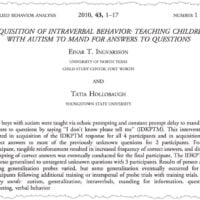Improving Conversational Skills of College Students with ASD
$30.00
BCBA CEUs: 1.5 CEUs
Transitioning to college represents a significant milestone in young adulthood, with early adjustments impacting well-being during and beyond the college years. Students with Autism Spectrum Disorder (ASD) face particular challenges due to social differences, potentially leading to academic struggles, peer conflicts, loneliness, and missed opportunities for future success. This presentation from the 2019 Michigan Autism Conference discusses research findings and lessons from recent efforts to assess and address the social deficits of college students with ASD.
Brand: CEUniverse
Description
Entry to college marks the greatest transition of young adulthood; early adaptations to this new landscape are likely to affect wellbeing during the college years and beyond. Students who exhibit social differences associated with Autism Spectrum Disorder, such as limited or inflexible conversation skills, are especially vulnerable to a poor transition. The college experience of intellectually capable students with ASD is too often characterized by academic failure, conflicts with peers, loneliness, and missed opportunities to prepare for fulfilling work and relationships in adulthood. The purpose of my presentation is to describe research findings and some objective lessons from our recent efforts to assess and treat the social deficits of college students with ASD.
About the Speaker
Dr. Amanda Karsten is an assistant professor in the Department of Psychology at Western Michigan University. She works primarily with WMU students and practicum supervisors who participate in the Extended University (Hybrid) track of the Master of Arts in Behavior Analysis Program. Dr. Karsten has over 16 years of experience practicing ABA and conducting applied research with people diagnosed with autism from early childhood through young adulthood. Prior to joining the faculty of WMU in summer 2017, Dr. Karsten was an associate professor at Western New England University. She currently serves on the editorial board of Journal of Applied Behavior Analysis (JABA) and a former Associate Editor for The Analysis of Verbal Behavior (TAVB). Dr. Karsten and her student collaborators have published their research in peer-reviewed journals such as JABA, TAVB, and Behavior Modification.
Free Preview
Below is the entire open-access version of this video. It does not contain embedded questions or interactions like the CEU version of the module.
4 reviews for Improving Conversational Skills of College Students with ASD
Sorry, no reviews match your current selections
You may also like…
-
Multimedia Tutorial

7 BCBA CEUs
An Introduction to Relational Frame Theory (RFT)
Eric J. Fox4.55 out of 5(494)$70.00 Add to Cart quick view -
Interactive Video

1.5 BCBA CEUs
B.F. Skinner on Education
B.F. Skinner4.96 out of 5(25)$15.00 Add to Cart quick view -
Interactive Video

1 BCBA CEU
The Effects of a Text Message Prompt on Conversation Between Dyads with Autism Spectrum Disorder
Julia Blanco & Marjorie Charlop$20.00 Add to Cart quick view -
Multimedia Tutorial

8 BCBA CEUs
An Introduction to Verbal Behavior
Norman Peterson4.22 out of 5(299)$80.00 Add to Cart quick view
Related products
-
Interactive Video

1 BCBA CEU
Essential Competencies for Practitioners Working with Children Diagnosed with Autism
Mary Jane Weiss3.67 out of 5(3)$20.00 Add to Cart quick view -
Interactive Video

1 BCBA CEU
How to Systematically Evaluate Treatments for Autism That Lack an Evidence Base
Matthew Brodhead5.00 out of 5(1)$20.00 Add to Cart quick view -
Interactive Video

1 Total BCBA CEU
1 Ethics CEUEvidence-Based Practice of Applied Behavior Analysis
Susan Wilczynski4.86 out of 5(14)$20.00 Add to Cart quick view -
Interactive Video

1 BCBA CEU
Incorporating Social Peers into ABA Instruction to Teach Social Skills
Kate LaLonde & Kenzie Gatewood5.00 out of 5(4)$20.00 Add to Cart quick view






Important topic, wish the content was delivered in a bit more of a practical manner
A great topic, often overlooked but very much needed to expand on!
Interesting lecture.
Very applied information in this presentation.